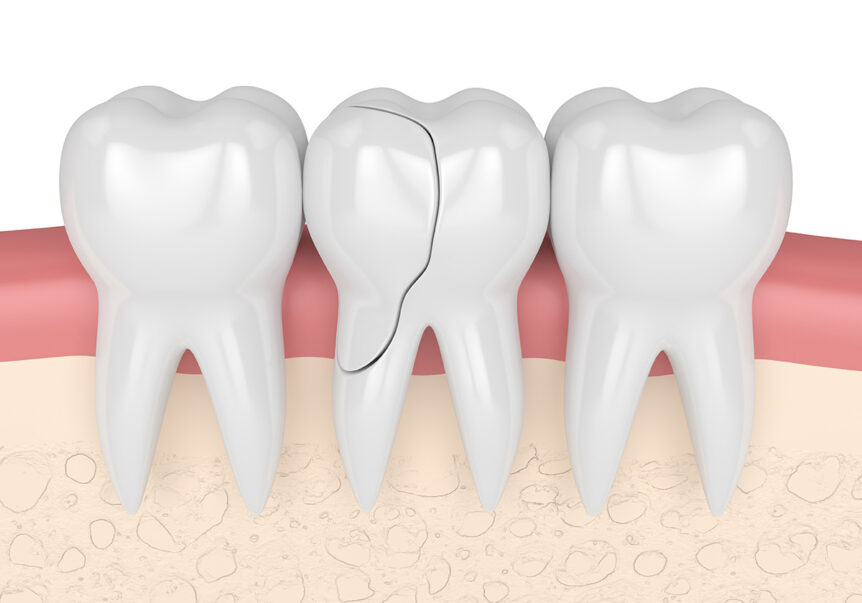Teeth are extremely strong, but that doesn’t mean they’re invulnerable. Even if you maintain a routine for oral healthcare, numerous things can cause a tooth to crack. We’ll explore the causes of cracked teeth, the available treatment, and some relief tips that can help you deal with the pain a cracked tooth can cause.
Causes
A cracked tooth is a fracture that affects the whole tooth, from the nerve to the chewing surface of the tooth. At worst, a crack can irritate the pulp (soft tissue inside the tooth which contains nerves and blood vessels) causing it to become infected or diseased. There are lots of different things that can cause a tooth to crack:
- Eating hard foods like nuts or hard candy.
- Accidents which involve serious trauma to your face or mouth area.
- Grinding or clenching your teeth, causing the tooth structure to wear down.
- Untreated cavities.
- Amalgam fillings that no longer properly support your tooth’s enamel.
Symptoms
Although a cracked tooth sounds like the sort of thing that you should be able to spot, many people aren’t even aware that they’ve got one. The crack isn’t always visible – particularly because the tooth is hidden – sometimes a hairline crack won’t even appear on an x-ray. However, the following symptoms might indicate that one of your teeth has cracked:
- Your tooth hurting when you eat (especially when you bite down on your food).
- Your tooth hurting when the temperature changes.
- Your tooth hurting when it’s exposed to hot or cold liquids.
- Your tooth hurting intermittently (as opposed to the constant pain you may experience with an abscess or cavity).
Since minor cracks tend not to cause very much pain, cracked teeth can be difficult to detect. In these cases, you don’t need to worry too much since cracks which don’t hurt tend not to be particularly serious. However, if you spot any visible cracks it may be worth visiting a dentist and having them check it out for you.
Treatment
Fortunately, there are a wide variety of treatments available to people with cracked teeth. Upon noticing a symptom, make an appointment with a dentist. The course of treatment can vary depending on how severe the crack is as well as where the crack is located; a tooth cracked in half requires a different level of treatment than a hairline crack, for example.
- If it’s a minor crack (or craze line), it’s probably superficial, and treatment is unnecessary. Your dentist may polish the tooth to improve its appearance and smooth out any rough areas that have developed as a result of the crack, but more substantive treatment isn’t required.
- Filling materials or crowns may be used to stop the crack from spreading, generally solving the problem.
- Endodontic treatment (root canal surgery) may be necessary if the pulp has been damaged.
- If the tooth has been cracked so severely that it cannot be saved, the dentist may need to remove the tooth completely so as to avoid any further damage.
Relief tips
Until you receive treatment, a cracked tooth can cause intense pain. Here are a few things that you can do to help yourself feel better until you’re able to find a more permanent course of action:
- Rinse your mouth with warm water.
- Take over-the-counter pain relievers.
- Apply an ice pack to your lips or teeth, thereby reducing the swelling around the area.
- Apply a gauze to any areas of your mouth which are bleeding. Generally you should do this for around 10 minutes, or until the bleeding stops.
Remember, none of these methods of relief are adequate replacements for proper dental care. Without treatment, your cracked tooth is only going to get worse, so it’s important to visit a dentist as soon as possible.
Got a cracked or broken tooth and need to see a dentist? Contact Ascent Family Dental and book an appointment with a local dentist immediately.

